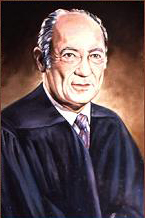About
Honorable Jacob D. Fuchsberg

Judge Jacob D. Fuchsberg
New York State Court of Appeals
The Law Center is named in honor of the contributions to the study and practice of law of the late Jacob D. Fuchsberg, a towering legal figure who served as Associate Judge of the New York Court of Appeals from 1975-83. Born on the Lower East Side of Manhattan, Fuchsberg earned his law degree from New York University School of Law, where he was a member of the Law Review. He spent many years as the nation's pre-eminent trial lawyer. He was president of the New York State Trial Lawyers Association and the Association of Trial Lawyers of America, where he founded Trial Magazine and The Roscoe Pound Institute – which held the prestigious Annual Chief Justice Earl Warren Conference on Advocacy.
In 1965, President Lyndon Johnson appointed him to the committee responsible for creating the first national program that funded civil legal aid for the poor. He was also a founder of the National Institute of Trial Advocacy and was one of the earliest and most active supporters of the establishment of clinical programs in U.S. law schools.
In 1964, as a trial lawyer, he won the country's first million-dollar personal injury verdict. On a windy day, a street sign had fallen and left a young boy quadriplegic. Judge Fuchsberg summed up to the jury, “Every time you walk out of here with a proud feeling of full justice done, wherever it leads you, that spire has just reached a little more heavenward.” Inspired by Judge Fuchsberg's representation, the young boy went on to become an attorney.
Judge Fuchsberg's most famous case was “Baby Lenore,” a tortuous struggle that received nationwide publicity in the early 1970s. In that case, he represented the adoptive parents of a young child whose natural mother sought to revoke her consent to the adoption. A New York court ruled in her favor, but the adoptive parents moved to Florida, where a court found for them. The case led to changes in adoption laws and procedures throughout the country.
In 1973, he took on the legal and political establishments, when he waged a primary campaign for the Democratic nomination for Chief Judge of the New York Court of Appeals, maintaining that his experience as a trial lawyer filled a need for a better understanding of those the Court served. He was successful in the primary but lost in the general election. The following year he was easily elected an Associate Judge of the Court.
Judge Fuchsberg’s judicial service was marked by an unwavering commitment to civil liberties and individual rights. His opinions set new standards for the protection of the accused, privacy rights, employee protection, and compensation for the victims of serious injuries. He was also a forceful advocate of equal educational opportunity and fair public school funding. Perhaps recalling his own climb from humble beginnings, he wrote, “Poor children, no less than rich, and the Nation of which both are a part, are entitled to an education that prepares today's students to face the world of today and tomorrow… without education there is no exit from the ghetto, no solution to unemployment, no cutting down on crime, no dissipation of inter-group tension, no mastery of the age of the computer...” Board of Education, Levittown Union Free School District v. Nyquist, 57 N.Y.2d 27, 51 (1982) (Fuchsberg, J., dissenting).
A generation later, Judge Fuchsberg's prescient dissenting opinion became the law of the state, in Campaign for Fiscal Equity, Inc. v. State of New York, 100 N.Y.2d 893 (2003).
While off the bench, he was a champion of equal rights for all. He earned national attention by leading a boycott that opened a previously all-male social club where Court of Appeals judges met for dinner. He also successfully challenged another club that discriminated against African Americans. Judge Fuchsberg and his wife Shirley also maintained a steadfast commitment to Jewish and other humanitarian causes. When he reached mandatory retirement age from the Court in 1983, he founded The Jacob D. Fuchsberg Law Firm, and practiced actively with his daughter and son until 1993. Throughout his distinguished career, Judge Fuchsberg was a crusader and a guardian of the rights of the people. Those associated with this Law Center will never forget the name, or the vision, of Jacob D. Fuchsberg.

